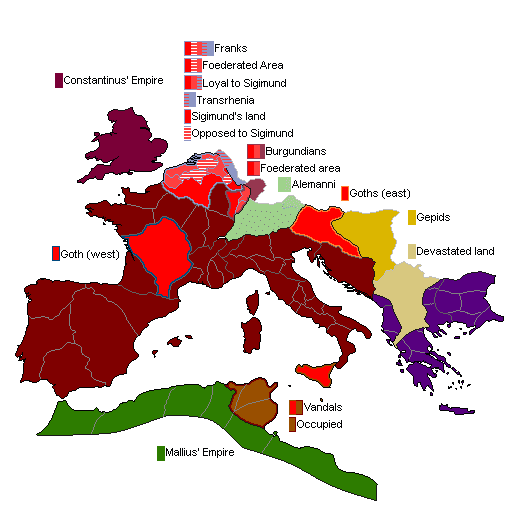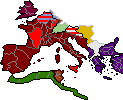„The future is secured, for them, for us, for everyone. “ – Nicomachus Flavianus
Galla:
daughter of Nicomachus Flavianus and Galla, soon to marry Honorius, whose
sister is named Galla and whose stepmother is also called Galla. Not only
because of this potential danger of confusion, but also because of her hair,
which, lighter than her younger brother’s, is still not blonde but a shade of
brown, she is called Flavia. Sometimes she is also referred to as Galla Minor,
Flaviana or Flavianilla.
The emperor
marries, a girl of 14 years, a decade younger than him. Honorius was married
before, to a granddaughter of his general Saturninus, but the girl died and so
did later the general. This time it seems more promising, the bride seems
healthy, she is pretty and most important she is from a mighty family -
actually two families. Her father is a Nicomachi, her mother a Symmachi. Both
are mighty and old clans of Rome. Honorius hopes to gain some popularity among
the Roman nobility with this move and also an heir for his throne. Even if he
tries to win over the nobility and the senate, so is he too afraid to celebrate
the wedding in the city of Rome. He prefers to stay in Arelate, close to his
protector Alaric.
Two weeks
before the wedding the Goth King appears in the city. Just a few days earlier
he was still fighting in northern Gallia but now he is back with some news -
good or bad ones; hard to tell. The Alani and Silingi, which crossed the Rhine
in 399 with the other tribes, were plundering Gallia for nearly 10 years now.
They mostly concentrated on the northwest. Neither did they ally like the other
tribes with Mallius, nor did they found an own realm to rule. They went
restless to the west, the south, than to the north-east and following the
Ligara upwards as Alaric’s troops entered Gallia. They were in Burdigala,
Turonum and Lutetia but on none of these places did they establish a kingdom.
As they followed the Ligara they even split in several smaller groups. All of
them continued their way to the north-west, the area dominated by Sequana and
Ligara. Every single group was a little army for itself making it impossible
for Alaric to win over them, not because they were too strong but they were too
many. He didn’t meet a single big army that he could challenge in a battle. But
in 408 the young Silingi Theuderic convinced the leaders of the most groups
that they need to work together to secure their freedom and defeat Alaric.
Theuderic, now King of Vandals and Alans, led his troops in the beginning of
409 in a Battle against Alaric. The Goth King won but made a pact with the
losers.
In Arelate
he arrived with this news and proved how powerless Honorius really is. He settled
the Vandals and Alans between Ligara and Sequana, without even asking for
permission. Alaric justified his decision with the fact that this land was
reserved for the Sicilian Vandals, but they refused to settle there, so the
land fell to their Silingian cousins, which were already in this area.
The day of the
wedding was a cold one, not only because of the weather, but also because of
the people who came to witness the event. No one of the senators, which were
present in the city liked to see the barbarians, especially because they still
remember how Gainas plundered the city in the emperor’s name. The Germanics
that arrived also preferred to stay alone. Mistrust poisoned the air in the
city. The emperor himself didn’t show any emotion on this day. The bride on the
other hand seemed more active, she didn’t love the man she married and she was
not excited about being with him, but she knew what power she could gain. Her
ancestors were philosophers, scholars and bureaucrats, but she was different.
As a boy she would have been a general or emperor, but as a girl she was only a
link between Honorius and the senatorial elite. Maybe in future she could be
able to prove herself as a leader. As she stood in front of the altar, it was
clear to her who was the mightiest man in the room; not her husband, not her father,
none of the senators, but the barbarian in the back of the church, who was a
bit tipsy and the only one, smiling all the time, King Alaric. She hated him.
He was a barbarian and also looked like one, he even stunk like one. His pride
seemed like arrogance to the young empress and his power was torture for her.
Besides Alaric and his guard were no other Germanics in the church. The
Burgundian King and his fellows stayed outside the city and only appeared to
compliment the emperor, whereas the Frankish King and Vandal King Godigisel
didn’t even appear in Arelate; the latter because he had to fear for his life
since he plundered Rome, the first because he had to fight enemies in his own
territory. The King of the Pannonian Goths, Himilvin, a man with religious
spirit, stayed away from the Trinitarian church, mostly because he thought bad
about the Roman way of Christianity, he didn’t like the Romans so much in
general, but knew that his people could for now only survive in an alliance
with them. On the others side did he like Alaric pretty much and both drunk
together the night before – that’s the reason the King appeared a bit tipsy in
the church.
The kings
would leave the city again a few days later, so did the senators, but Flavia
stayed and would become in the following years the strong woman behind
Honorius.
Map
The Western and parts of the Eastern Roman Empire in 409 AD.
Red=Western Empire; Light Red=Goth; Striped=other foederati; Brown=Vandals
Purple=Eastern EmpireMagenta=Britannian Empire
Yellow=Gepids







